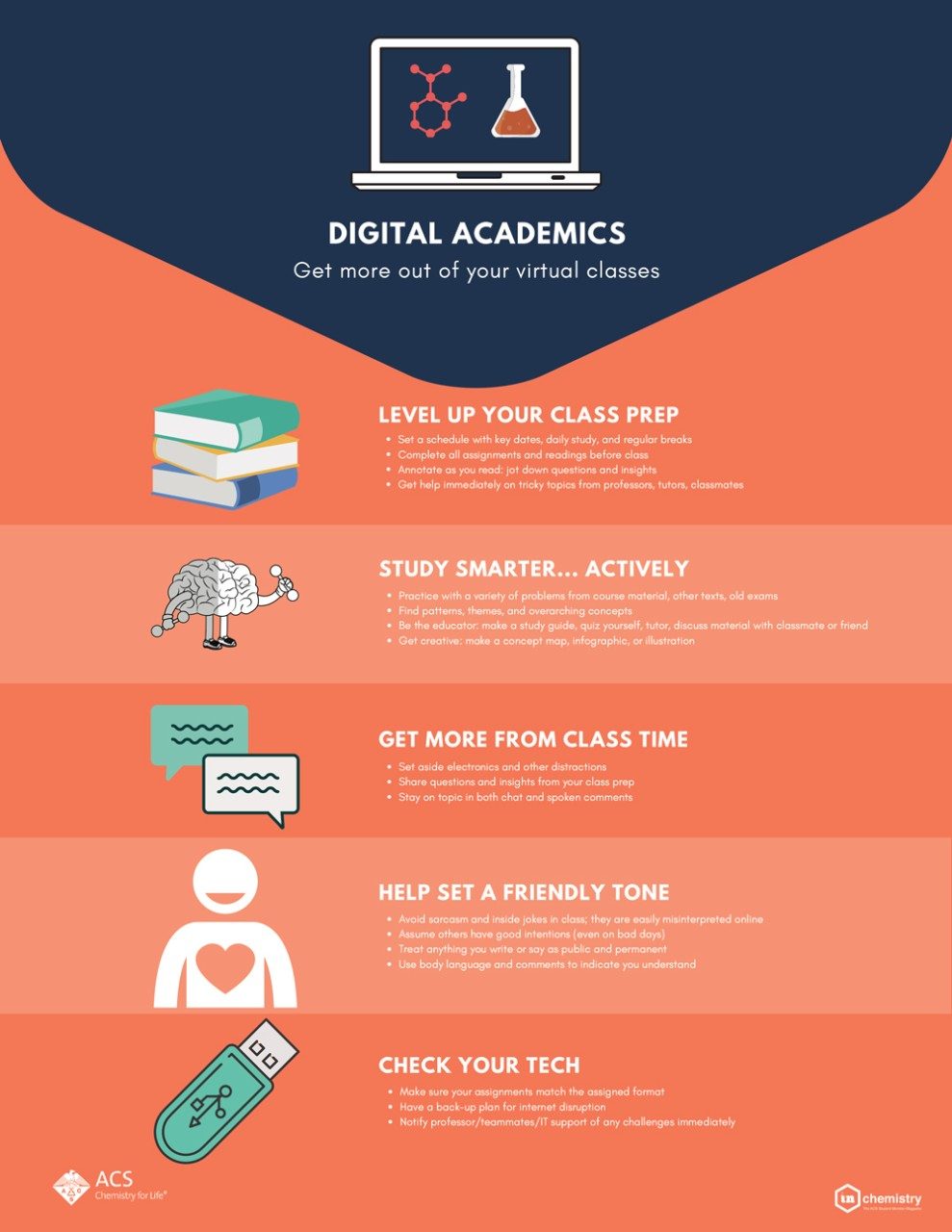How To Succeed in Online Classes During the COVID-19 Pandemic
Last updated 9/22/20

Like many students, you are probably in the position of being unable to return to campus because of the COVID-19 pandemic that has caused respiratory illness in almost every country, overrun hospitals, and made physical distancing (“social distancing”) the new normal. Colleges and universities everywhere are shutting down their campuses and moving classes online.
This isn’t the first time a pandemic has forced distance learning upon unprepared students. In 1665, the Great Plague of London forced Sir Isaac Newton and his classmates out of Trinity College for a year. Still, Newton used his time at home to develop his early work on calculus, using prisms to develop his theories on optics, and making his famous gravity observations.
Although you may not be in the midst of revolutionizing math and science, you can take control of your learning and keep up with your classes. Here are six things you can do to thrive in the switch to virtual learning.
COVID-19 & You
Understand how COVID-19 became a pandemic and what you can do to help your community.
1. Stay disciplined
Your home may not look like campus, but you are still in college. Your 15-hour course load still requires 15 hours per week of “in-class” instruction, plus roughly 30 hours of studying, researching, and writing, whether you are physically on campus or not. Because you’re at home, there’s a lot of potential for distractions, so you’ll need to focus on staying focused to stay on track.
To concentrate on schoolwork, set aside a workspace and create a study schedule, just as you would if you were on campus. “Making your dining table double as a desk for the day is one way to create a dedicated space to ‘attend’ classes,” suggests Michelle Boucher, a chemistry professor at Utica College. You could even take a lap or two around your apartment or house as a way of “walking to class.” It will help get you into the headspace needed to focus and study.
John Kirk, associate professor of chemistry at Carthage College in Kenosha, WI, says another good way to keep focused is to use a calendar app to schedule blocks of time in your day for class, studying, etc. “Google Calendar works well, as I’m sure others do,” he advises.
You want to make sure that you attend live online lectures or use time you would normally be in class to watch lecture recordings. In addition, active participation in online discussions and study groups will help you keep up with learning content and your assignments. “Look at what you have to do for the whole week and divide it up into manageable blocks for each day,” advises Amanda Carroll, chemistry professor at Tennessee Tech.
Of course, now your interactions will most likely be done through online postings, a chat box, or video call. “If you are the type of student who is an awesome active listener, always nodding and responding to the lecture, you might have to find different ways to show that you are following along with a conversation,” says Boucher. “A simple ‘understood’ or ‘thanks’ in a chat room can help a lot.”
With online communication, you miss the subtlety and social cues that come with body language and eye contact. What sounds like a lighthearted quip in your head can come across as harsh without your smile. Write out what you want to say prior to posting your thoughts online to help organize thoughts and communicate clearly.
Another way to stay disciplined is to put your phone out of easy reach so that you’re not tempted to check text messages or Instagram every 5 seconds. You can do that when it’s time for a break, just as you would when leaving a class.
2. Be flexible
Your classes are now online lectures, videos, or a series of readings. Your library is now digital, and office hours are virtual. Resources are still available; they are just in a different form. Being flexible about these changes will help you adjust.
Sometimes you’ll need to adjust at a moment’s notice, like when you lose your Internet connection. Even if you get stuck not being able to be online, you still need to get work done. So have a backup plan. Download course materials so that you can access them offline and make sure you have your professors’ e-mail addresses and phone numbers in case you need to reach them about interrupted work.
“It’s important to reach out early and often,” Boucher says. “Have conversations by e-mail if possible,” she adds.
Glen Briand, a professor of chemistry at Mount Allison University in New Brunswick, Canada, agrees. Like many other countries, he and his colleagues faced drastic changes in the wake of COVID-19, as abrupt calls for students to leave campus began. “I personally have students from the opposite coast of Canada and other countries (e.g., Japan) that have had to pack up their apartments/residence rooms/lives and make travel plans to return home very quickly,” he shared.
“As many have been or will be in transit, there have been many requests for deadline extensions on assignments and take-home exams. Students should contact their professors or university student services if they are having trouble keeping up with their work or meeting deadlines.”
On-campus students may need to do the same if there is an outbreak at their school.
Some instructors are providing additional learning resources (YouTube videos, simulations, etc.) that may not be required. “The additional time you spend on these things could really help you learn the material so factor this into your schedule as well,” recommends Carroll. In addition to online resources provided by your professor, tap into other resources for help. These may be a good place to start:
- Chemistry simulations on PhET
- ChemCollective
- Tutorials by the University of Illinois
- Royal Society of Chemistry learning resources
- Purdue University general chemistry resources
- Chemistry in Context interactive library
For more advanced courses, try ACS open access journals and some of the ChemEd X resources for educators.
As campuses continue to alter decisions about in-person classes, you will need to make adjustments. If you are in the middle of a group project or just starting one before having to transition to online learning, document your goals and each person’s tasks. You can share and edit documents using platforms like DropBox or Google Docs. Just make sure that you communicate clearly and often, using video chat, group texts or calls, or e-mail to keep up-to-date on progress. “There’s a variety of video conferencing tools available to students for free—Zoom, Google Hangouts, Apple FaceTime,” says Kirk. These are also helpful tools to use for study groups.
One of the big challenges with group projects at any time is making sure everyone contributes equally. Talk through roles and responsibilities, create clear expectations, and establish deadlines for milestones. Have regular check-in meetings to ensure accountability and help everyone complete the project. Just remember to communicate, assign tasks that play to strengths of members, and proofread your work.
3. Manage your time wisely
The benefit of face-to-face classes is that you can rely on them to assess where you should be in the curriculum and remember what exams and deadlines are coming. With new circumstances, you may need to set up your own reminders.
Logging in to classes every day will allow you to confirm important deadlines for assignments, quizzes, and exams as some dates and deadlines could change. And check your university email so you don’t miss any information about your classes. You can forward your university email to an email address you check regularly if you don’t want to check multiple emails daily.
Once you know what’s going on, get organized and make a plan for completing work. If you prefer structure, develop a written schedule of when you need to be available online for a virtual class and when you will work on projects and assignments.
“You may now have more control of your time, so think about when you work and learn best and try to capitalize on that,” says Carroll. “Some people work best in the morning while others hit their stride at night. Regardless, keep yourself accountable of start times so you can create some momentum and then keep it going.”
Also consider the difference in the amount of time you have to devote to online learning. "All activities take much longer than usual," warns Peter Seidl, professor of chemistry at Federal University in Rio de Janeiro, Brazil. "But don't let this discourage you!"
Time Management Apps
There are a lot of time management apps, but these are some favorites (keep looking until you find the one that is right for you!):
- Focus Keeper – Time Management
Focus Keeper helps you keep your productivity high, avoiding burnout using the timer. Work with time. Not against it! Basic Focus Steps - It’s all about focusing your work efforts in timed 25-minute chunks, with a 5-minute break in between each burst of activity. - Trello – Track your projects in a visual way
Trello’s boards, lists, and cards enable you to organize and prioritize your projects in a fun, flexible, and rewarding way. - Power Planner
Power Planner is the ultimate homework planner for students, featuring online sync, grade calculation, automatic reminders, and more! - Todoist
Todoist is a straightforward to-do list app. Whether it’s a detailed project list or a shopping list, Todoist can help. It keeps your life organized and helps maintain a healthy work-life balance. - Toggl
A time-tracker app that helps you get things done.
4. Cut everybody a little slack
Although Newton was purportedly kind of a jerk, you’ll manage a lot better if you keep your patience when things don’t go smoothly. Unless your professor has an extensive background with online teaching, he or she is improvising just as much as you are. Professors normally spend months, even years, developing new courses, but they were given days or a week to move their courses online. Chances are, this is all new to them.
So, if your course isn’t instantly engaging and your materials are tough to access, remember that your professors are doing the best they can. “We know this is a hectic time and there’s a lot going on around us, and we really want students to succeed,” says Carroll. “Everyone is worried about their families and friends and no one knows when this will end. Use your schoolwork as a way to take your mind off the chaos and direct it towards something productive.”
And cut yourself some slack, too. Like any method of learning, distance education isn’t the best fit for everyone. It’s okay to find yourself struggling online even if on-campus courses were going great. Keep trying new things to find what works best for you.
“You may need to have a conversation with parents, significant others, or roommates about expectations and boundaries,” suggests Carroll. “People that are not in school may not realize the demand it can have on your time.”
Some parents may feel like you’re home on break and want you to help with tasks or hang out more than you might have time for. Roommates may stay up late or get up early, or they may be loud when you’re trying to listen to lectures or communicate with instructors or group members. Let the people around you know what you need to be able to get your work done.
“Letting someone know when the door is closed you may be on a Zoom call, in class, working on an assignment, or taking a quiz/exam can keep them from disturbing you,” says Carroll. “Opening a line of communication can be helpful for them to understand so you can have the time and space you need to be productive and successful.”
5. Be kind to yourself
Spending the day hunched over the computer is rough on the body and the brain. Take breaks roughly every hour—stand up, stretch, jog in place, take a bio or coffee break, or whatever you need to do. And don’t forget to drink water!
Chemistry and biochemistry students “typically have more kinetic learning experiences than many other majors,” says Boucher. “We have labs, long labs. We walk around and stand doing things with our hands.” Sitting still and watching simulations on a screen is just not the same.
Rest assured that you still are learning—you are just focusing on theory this year and saving practical experience for the fall. In the meantime, try propping up your computer into a makeshift standing desk for your simulations. And have some hands-on fun teaching simple science experiments to your family, pet, or favorite stuffed animal.
6. Keep in touch
On campus, opportunities to ask questions, join study groups, visit tutors, and chat with friends are a short walk away. These activities help you keep up with the course, and keep you in touch with other people. Humans are social creatures—some more so than others, of course, but connecting with people matters for everyone.
Online, you need to make a conscious effort to stay connected. So reach out to your professor with questions, participate in online discussions through your course, join (or start) virtual study sessions, and keep in touch with your peers via phone calls, text messages, e-mail, and social media.
“Discussion boards are great for crowd-sourcing answers to questions many other students are having,” says Kirk. “Faculty are pleased to see when one student asks a question and it is answered by another student. This is true for both class material and for general how-to questions.”
If you find you thrive on structure, incorporate communications into your schedule. “Many faculty are doing virtual office hours, whether by video chat or by message board,” says Kirk. “Make use of these,” he emphasizes, adding that it’s very helpful for students to reach out to faculty and other students with ideas on studying and how to stay engaged.
Carroll suggest adding to your calendar your instructor’s office hours and, if there is one, the link to the Zoom (or other platform) meetings. That way you’ll get a reminder when it’s time for meetings and you won’t miss opportunities to get help during office hours.
Just because you’re forced to be isolated doesn’t mean you’re alone. Close and regular contact with professors, classmates, friends, and family will help you stay motivated and engaged.
“While so much is outside of your control right now, taking advantage of ways to virtually engage with school, such as using digital tools and reaching out for help, is a small measure of control that can help in an uncertain world,” says Boucher.
Editor’s Note
We understand the Herculean challenges professors are facing to convert their courses to online instruction and address the many needs of their students. Among them are the professors who took precious time from their ever-more demanding schedules to contribute thoughts to this article. We are grateful to these dedicated faculty for their kind generosity:
- Simon Bott, Swansea University, Wales
- Michelle Boucher, Utica College, New York
- Glen Briand, Mount Allison University, Sackville, New Brunswick, Canada
- Amanda Carroll, Tennessee Tech University, Cookeville, Tennessee
- John Kirk, Carthage College, Kenosha, Wisconsin
- Peter Seidl, Federal University, Rio de Janeiro, Brazil
The COVID-19 virus is hitting everyone hard. Share your best coping strategies with @ACSUndergrad using #inChemMag






